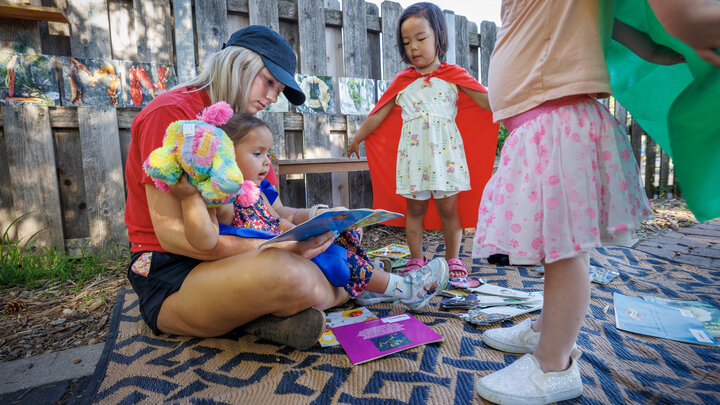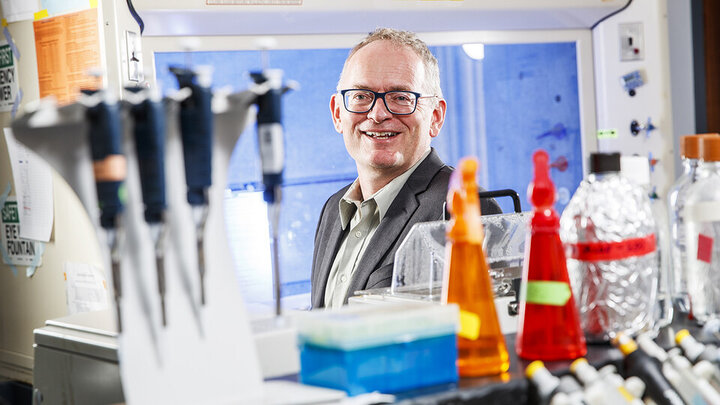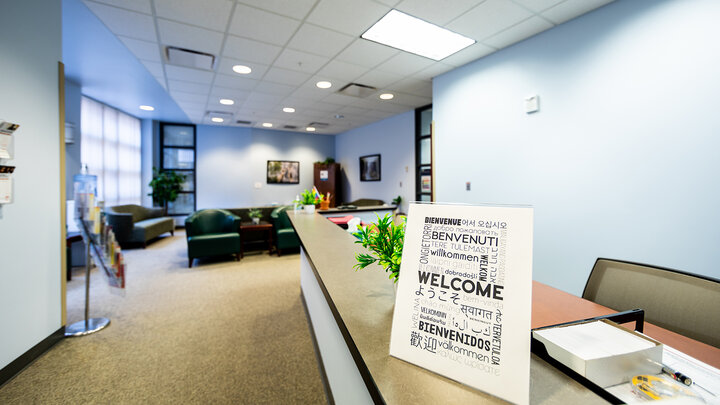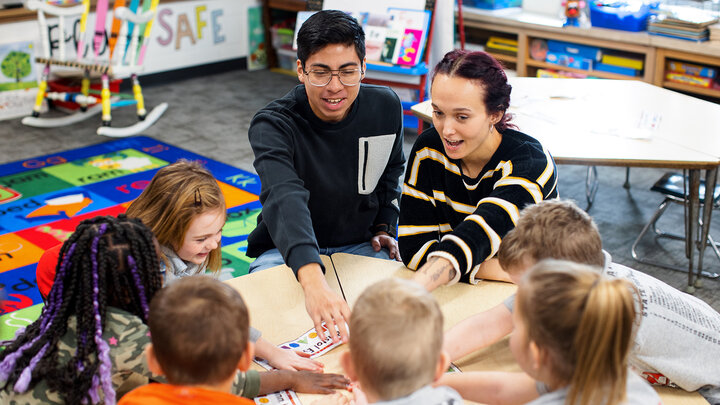Since 1925, one laboratory on East Campus is responsible for producing some of the most dynamic teaching, outreach and research ever to come out of the university. You won’t find a microscope in this laboratory, but rather young children singing and playing outdoors. They’re enrolled at the Ruth Staples Child Development Laboratory.
The child development lab is part of the College of Education and Human Sciences ’ Department of Child, Youth and Family Studies . It offers full-day childcare and preschool services for children 18 months to 5 years and is open to the entire Lincoln community and surrounding area. The lab school also serves as a training ground for students studying to become teachers, and a research lab for faculty, students and affiliated scholars to develop new knowledge on children, families, and early childhood education. The lab school has long been recognized as a leader in early childhood development, even being named the program of the year in 2020 by the National Coalition for Campus Children’s Centers.
Thirty-eight families are annually enrolled at the child development lab, equating to about 800 children during the past 20 years.
The Jahan family has been a part of the child development lab since August 2020. Israt Jahan is a doctoral student in the School of Natural Resources. A native of Bangladesh, she and her husband Manirul were overwhelmed at the thought of raising a child away from their families while balancing full graduate school workloads. That all changed the day she walked past the lab school and saw the children outside. After initially being placed on the waitlist their son Ishmam was enrolled in the Bluestem classroom. Beyond high-quality childcare, the Jahans also found a supportive community to help them raise their son.
“As a first-time mom, I am not an expert on child development. I’ve had no exposure to how to raise a child with independence and confidence, or how to support his strong willingness and need to explore,” Jahan said. “Every day we learn from the teachers. There are so many things Ishmam has learned, but I think I have learned even more.”
The Jahans’ experience is not unique, according to Jenny Leeper Miller (’03, ’09), director of the child development lab. She says the child development lab fosters a “community of learning,” in which children, parents, students and faculty all learn from each other.
“Family engagement is the highest priority in an early childhood setting,” Miller said. “The parents are the child’s first teacher. It’s critical for us to have a partnership to ensure the child has the best learning experience possible and we make sure our pre-service teachers training at the lab understand that.”
Approximately 200 students come through the facility each year completing practicum and teacher training. Pre-service teachers placed at the lab school get hands-on practical experiences in teaching in the early childhood classroom while being coached and mentored by highly skilled faculty at the lab school.
One of those students is Meg Wolken, a sophomore from Plattsmouth. Wolken had the opportunity to complete a practicum at the child development laboratory during one of her first classes as a student at the university.
“I was very nervous at first because it was my first semester of college, but it was such a welcoming environment to be brought into.”
Wolken’s practicum was part of a class on curriculum and instruction. She and her classmates first learned about developmentally appropriate practices during a classroom lecture, and then had the opportunity to witness and practice those influences under the guidance of faculty at the child development laboratory.
“I’m a hands-on learner. I need to see things happen instead of being told what will happen,” Wolken said. “It’s really helpful to go directly from class to the lab and see how the ideas are applied, and how you need to be flexible and learn to adjust to support the child’s development.”
The experience was so impactful for Wolken that she changed her major from elementary education to elementary and early childhood education.
Wolken’s course is taught by Christine Corr Kiewra, an assistant professor of practice in the Department of Child, Youth and Family Studies at Nebraska. She’s uniquely qualified to work with students who are training at the child development lab, not only because she has more than 25 years of experience in early childhood care and education, but also because she went to the lab as a child with her siblings.
“I have very vivid memories of spending time outdoors, and riding trikes. It’s fun to share those memories with my students today.”
It’s part of the culture of learning at the child development laboratory to have daily routines in a healthy, comfortable, and engaging outdoor space for children and teachers. In addition to outdoor learning and play time, children also eat and nap outside. Kiewra says it is eye opening for her students to see that the children are actually learning so much math, science or teamwork skills outside and aren’t just at recess.
“It’s a phenomenal place for teacher training,” Kiewra said.
Child development lab faculty continually seek opportunities to expand their own learning and teaching. Faculty have led students on study abroad tours to New Zealand, Scotland and Italy focused on nature-based education and early childhood environments. Faculty and students have also had the opportunity to learn from research being conducted within the lab. Current research projects being conducted at the lab include projects designed to improve teachers’ use of equitable and culturally responsive teaching practices in the classroom and learning more about how parent-child engagement affects children’s development with the intention of developing more effective family programs.
With so much hands-on teacher training and research being conducted, how does it impact the daily experiences of the families coming to the child development lab? According to Jahan it has only added to their positive experience.
“As a parent, I really feel privileged to be a part of this community because the students who are training there and researchers who are working there are doing so with intention, and have a strong desire to improve the system,” she said. “I appreciate the energy and positivity they bring, and their constant desire to grow and learn.”
As the child development lab looks to the next century of growth, it has a big goal in mind. The College of Education and Human Sciences is actively raising funds to go to a new child development lab and family resource center to be built on the east side of East Campus. The proposed facility would maintain the strong programming that the child development lab is known for and also include the Family and Couple Clinic, a facility offering services to people in the community facing challenges within their marriage or family. Therapy in the Family and Couple Clinic is provided by students in the marriage and family therapy program.
“The new child development lab and the family and couple clinic will improve and enhance our facilities in order to expand the number of children and families that we can serve while also attracting more students to early childhood education and mental health fields,” said Sherri Jones (’85, ’87, ’94), dean of the college.
The idea of a new facility is an exciting one for the current faculty, students and families at the child development lab as it would expand their community of learning to new levels.
College of Education and Human Sciences
Child, Youth and Family Studies




